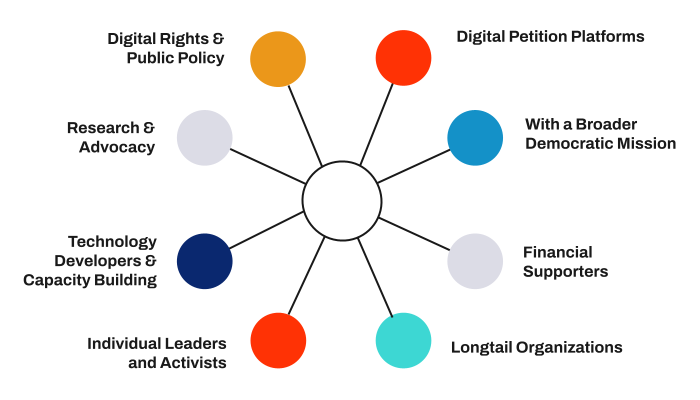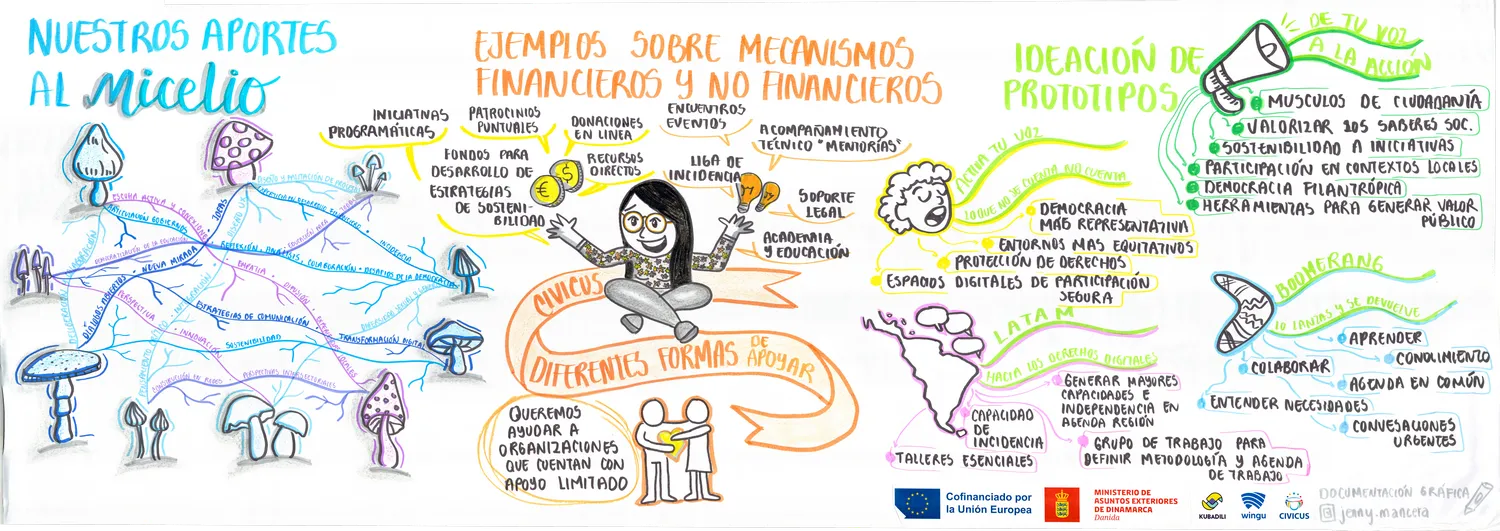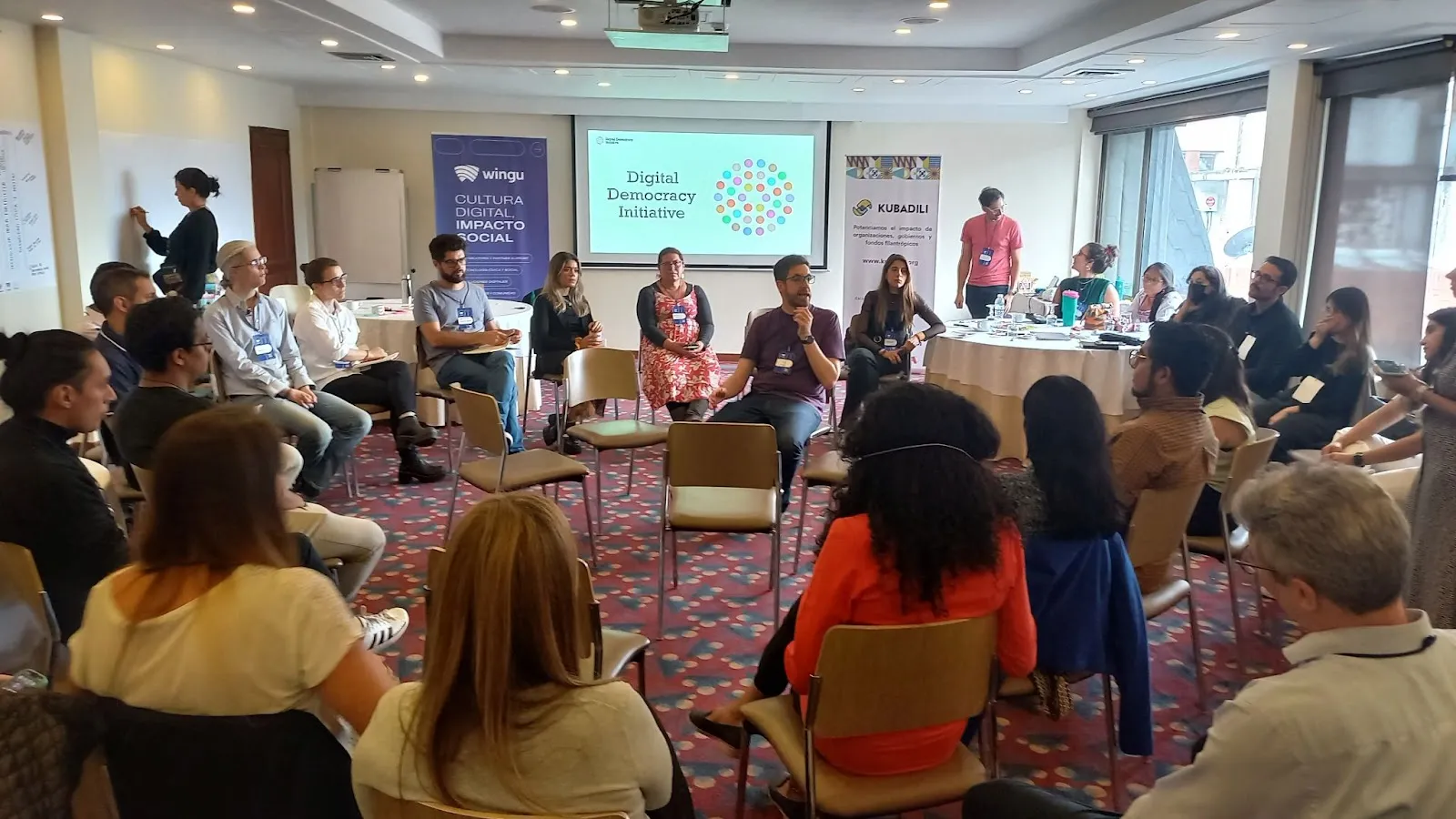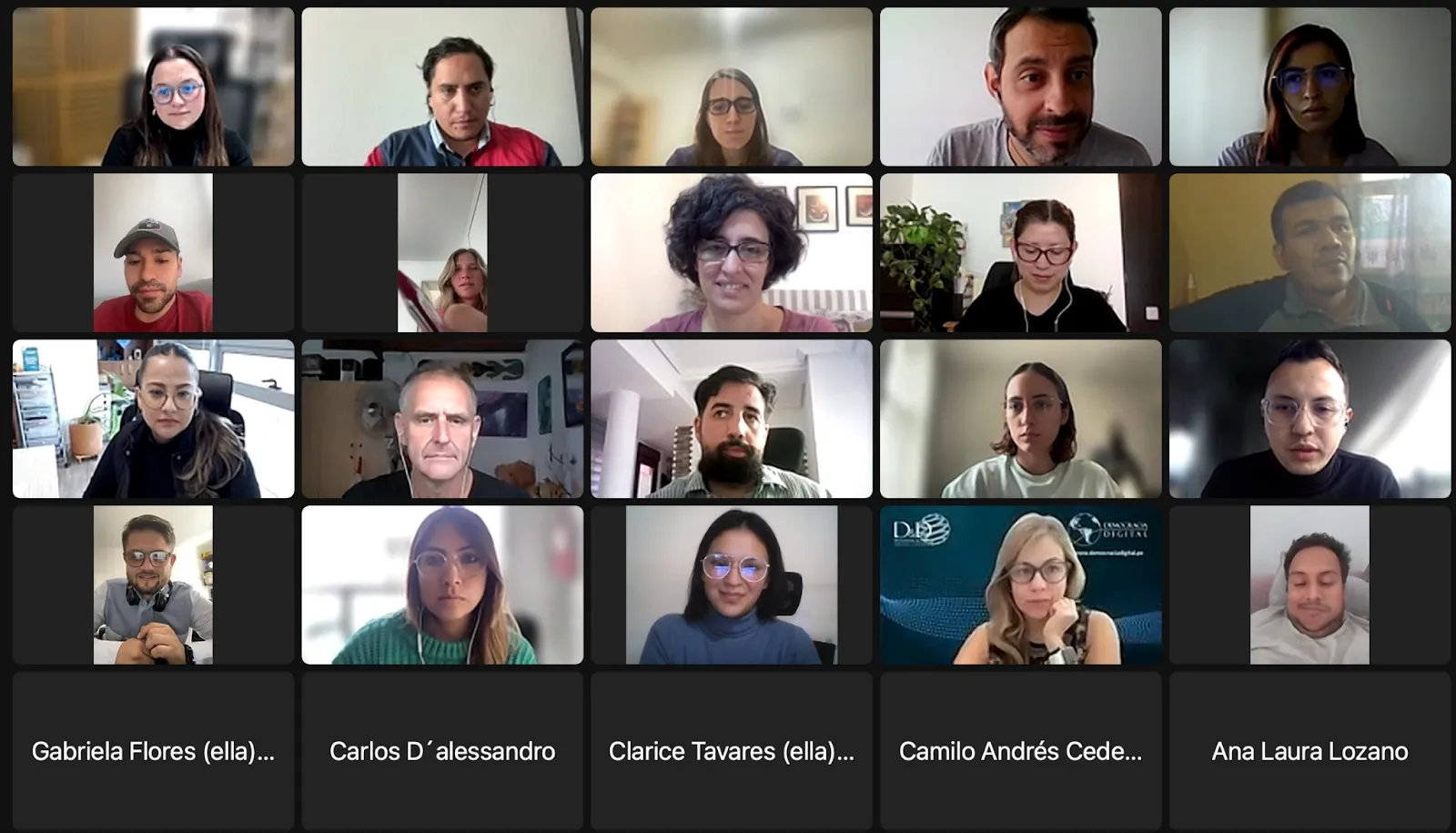
Regional Co-Design project for Digital Democracy Initiative
Enhance Digital Democracy in Latin America & The Caribbean
Date: February to May, 2024

ABOUT THE PROJECT
This project is part of the Digital Democracy Initiative: an ambitious programme launched and funded by The Danish Ministry of Foreign Affairs with the support of the European Union and lead by Civicus, aiming to strengthen and safeguard inclusive democracy under pressure in the digital age.
Wingu and Kubadili were selected by Civicus after an Open Call for Proposal to conduct a regional exploration with local civil society from Latin America and the Caribbean to identify context-specific needs and opportunities to use digital technology to promote inclusive democracy and the codesign of new potential mechanisms to channel financial and nonfinancial resources to advance the digital resiliency of civil society in the region.
Specific objectives include:
Mapping of the civil society actors in the local ecosystem in each region who align with the target groups of the DDI and the relevant codesign process.
Identify participants for regional codesign online and in person sessions and aims to identify the support and resourcing needs of local actors relevant to the DDI target groups and codesign with them prototypes of potential mechanisms for strengthening the support and resourcing infrastructure for civil society working on digital action on inclusive democracy.
Develop prototypes and provide provisional strategy and related potential pathways of action for strengthening an existing or creating a new resourcing mechanism in the region based on the prototypes.
→ ACTIVITIES CONDUCTED
→ THE CHALLENGE
Identify context-specific needs and opportunities for using digital technology to promote inclusive democracy in Latin America and the Caribbean.
→ THE CONTEXT
The digital democracy ecosystem in Latin America and the Caribbean comprises various groups of organizations, each representing specific subsets of actors within the ecosystem. This diverse constellation includes entities focused on blending technology with democratic processes, platforms for civic participation, organizations that, while not primarily centered on digital democracy, incorporate aspects of it into their broader activities and individual leaders and activists. The mapping conducted offers a comprehensive view of the key players and their roles within the digital democracy ecosystem in Latin America and the Caribbean.

Regional digital democracy ecosystem
→ THE PROCESS
The co-design initiatives aimed to enhance digital democracy in Latin America and the Caribbean by developing both financial and non-financial support mechanisms. These initiatives involved a broad representatives of key stakeholders, including NGOs, tech experts, individual leaders, and civil society activists, to:
- Strengthen Digital Resilience: Equip civil society with the tools and resources necessary for effective and secure digital engagement.
- Foster Inclusive Participation: Ensure that digital democracy tools and policies are accessible and beneficial to all, particularly sub represented communities.
- Innovate Support Mechanisms: Create innovative and sustainable support structures tailored to the region’s diverse needs.
- Promote Sustainability: Build long-term viability into digital democracy efforts.
The process of co-design was divided into five stages: 1) Framing the problem, 2) Gathering Data, 3) Mapping the system, 4) Identifying Leverage points(prototyping) and 5) Synthesis of findings and next steps.
Although all the steps were of high importance, Mapping the system and Identifying Leverage Points were critical for prototyping. These two steps occurred during the in person workshop.
The design of the three days workshop integrated diverse methodologies such as Design Thinking, Inception Deck and Art of hosting practices to create the adequate context for the co-design to occur. The atmosphere of collaboration, high level of engagement and seniority of the participants proved that the design, and methodologies used were up to the challenge.
The work of the participants during the codesign events resulted in the development of four prototypes that represent innovative approaches to address the identified challenges and promote a more inclusive and participatory democratic environment.
→ THE TEAM
→ THE OUTCOMES
- Mapping of Actors and Initiatives: Comprehensive database of over 400 actors and 50 initiatives engaged in promoting digital democracy in Latin America and the Caribbean. This mapping exercise provided valuable insights into the breadth and diversity of the regional actors in the ecosystem. Includes a visualization tool to map actors across the regions.
- Participant Lists Finalization: Participant lists for both in person and virtual workshops were finalized, ensuring diverse representation and expertise. Special attention was paid to achieving gender equity and inclusion of marginalized communities, with female participation exceeding 60%.
- Research Findings, Ecosystem and Thematic Axes: Valuable insights were gathered and analyzed, contributing to a comprehensive delineation of the ecosystem and enhancing understanding of digital democracy strength and challenges perceptions within the region. The review identified a key agenda comprising six main thematic axes and forty-eight sub-axes. Additionally, fifteen critical challenges, as perceived by civil society organizations, were recognized in the development of participatory and inclusive digital democracy.
- Online Workshop: Several virtual meetings were held as part of the process to gain clarity and different perspectives on the agenda, actors and ecosystem related to Latin American Democracies. Furthermore, an Virtual Open Space was conducted, in which 40 people attended, to sense the ecosystem, to gain a broader perspective on the topics that were important in relation to digital democracy and to connect and discuss important issues among different actors.
- In-Person Workshop: A 3 days event was held In Bogotá, Colombia on the 17th to 19th of April, with the participation of 28 more relevant social organizations dedicated to advancing Inclusive Democracy across the region. The proposed methodology, agenda, and dynamics proved to be successful in achieving our intended objectives and were warmly embraced by the participants. We chose to use a Systems Thinking approach, mixed with Design Thinking techniques, and Inception Deck activities to maintain a high level of engagement during the three days and achieve the outcomes required by CIVICUS.
- Engagement & Communications: We not only achieved our goals but exceeded them, with +95 answers to the initial survey, +40 people at the online workshop and +30 people at the in-person workshop (10 more than expected).
- Codesign workshops and prototyping: With active, committed, and generous participation of all attendees, whose collaboration was pivotal in achieving these outcomes, we successfully achieved the attainment of our main goal: the development of innovative, viable, and measurable prototypes.
- Strategy recommendation: To ensure effectiveness and sustainability, recommendations were made on the potential pathway of action of the financial and non financial mechanisms proposed, based on the analysis of the prototypes and the understanding of the current context.
CO-DESIGN PROCESS IN NUMBERS
people where part of the process
actors + 50 initiatives mapped
innovative prototypes
ACTOR MAPPING
As a part of the project deliverables, we have developed the initial version of a visualization tool to map actors across the different regions. The purpose of this tool is to enhance coordination and visibility among these actors, highlighting their expertise and areas of focus.
FUNDAMENTAL FINDINGS
01
Civil society across Latin America and the Caribbean is not suited enough to employing digital technology to foster inclusive democracy.
02
Digital democratic spaces in the region do not reflect the diversity of its societies; key communities are underrepresented and often absent.
03
Recognizing Underrepresented Communities in Latin America and the Caribbean is urgent.
04
It is crucial to recognize how these prevailing stories contribute to the underrepresentation of diverse groups.
05
Social media platforms are central to digital democracy: offering accessible ways for political engagement vs facilitating intensifying political polarization and enabling the spread of misinformation, defamation, discrimination, political stereotypes, stigmatization.
06
The social sector’s limited engagement in impactful dialogues on digital democracy with governments, telecommunications and big tech companies is constrained by inadequate advocacy tools and a lack of thorough understanding about critical issues.
07
Limited collaboration and articulation within the social sector significantly hinders the development of effective strategies for using technology to expand civic spaces.
08
It is essential that digital capacities permeate social organizations over time, allowing them to grow collectively. The articulation of various actors, the creation of knowledge exchange networks, and collaborative work are fundamental for profound transformation and significant impact.
FINAL RECOMMENDATIONS
For this initial and focused stage, it is proposed that the DDI undertake actions on two fundamental factors that contribute to building the ground capacities for strengthening regional civic spaces:
- Development of Organizational and Individual Capacities and Digital Competencies for the social sector that has no connection or lower connection with digital forms of participation. Improve infrastructure capacity and the ecosystem for pro-democratic civil society to implement digital-driven civic actions.
- Increasing the Capacity for Action in Civic Spaces for Underrepresented Communities. Create opportunities for broader and more diverse civil society groups to engage in democratic participatory digital-driven actions, ensuring the inclusion of underrepresented communities in digital democracy spaces.
The design of support mechanisms for the region requires an integral, systemic, and sustainable approach over time, containing parallel and simultaneous lines of action that promote and guide social transformation towards inclusion and diversity. While the design of two support mechanisms—one financial and one non-financial—was requested, we have decided to address both comprehensively in formulating the recommendations, as synergy between both mechanisms is necessary to develop robust solutions.



